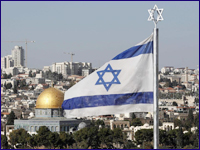 From 1946 to 1948, my father served as a medic in the British Army in what was then known as British Mandate Palestine.
From 1946 to 1948, my father served as a medic in the British Army in what was then known as British Mandate Palestine.
Enacted by the League of Nations in 1919, the mandate was assigned to Britain at the end of World War 1 following the collapse of the Ottoman Empire. The objective of the mandate over the Ottoman Empire’s former territories was to provide, ‘Administrative advice and assistance until such time as territories are able to stand alone’. The mandate also required Britain to put into effect the 1917 Balfour Declaration which endorsed ‘a national home for the Jewish people’.
Stationed in Jerusalem, it was there my father learned much about the Jewish people.
But that wasn’t his first encounter.
Attending primary school in the 1930s, my father told me the story of returning to school after the Christmas holidays one year and the teacher asking all the students in the class what each of them had received for Christmas. One by one, and with great delight, the children described the wonderful presents they had received.
Until, that is, it came to my dad’s friend Maurice.
“And what did you get for Christmas, Maurice?”, asked the teacher.
“I didn’t receive anything Miss”, Maurice replied solemnly.
“What, nothing?”, quizzed the teacher gently. “So, what did you do over Christmas?”, she asked.
“Well Miss, my family is Jewish, and my father has a toy shop, so every Christmas Day we go down to the shop and hold hands and look up at all the empty shelves and sing ‘What A Friend We Have in Jesus’.”
Thus began my father’s admiration of the Jewish people. Their creativity, their intelligence, their courage, and of course their sense of humour.
In the 75 years since the end of the British mandate and Israel’s 1948 declaration of independence, the Jewish people have created a modern state that has become a global technological and entrepreneurial powerhouse.
With few exceptions, all adults in Israel – both men and women – take part in compulsory military service immediately after leaving high school.
After their military service, Israelis then take these experiences with them into the private sector – first with their university studies, and then into business. Many highly successful start-up companies in Israel were founded by those who served together in the military.
It was recently reported that one of the world’s biggest investors, Warren Buffett, has only ever invested in one country outside of the United States, and that is Israel. When announcing that his firm, Berkshire Hathaway, had paid $2 billion for 20 per cent of Israeli toolmaker Iscar, Buffet said, “Israel reminds me of the United States after its birth. The determination, motivation, intelligence and initiative of its people are remarkable and extraordinary.”
All of this achieved while being surrounded by hostile countries which have declared war on Israel numerous times, with many to this day committed to ‘wiping Israel off the map’.
One of those countries committed to Israel’s destruction is Iran, which continues to pour billions of dollars’ worth of weapons into terrorist organisations who are supported by local Palestinians.
Enter Australia’s Prime Minister Anthony Albanese declaring earlier this month that parts of Israel are ‘Occupied Palestinian Territories’ and that Israeli settlements are ‘illegal’.
Not helpful, Prime Minister.
Not only is this factually wrong, but it also puts Australia completely out of sync with our closest ally, the United States, and aligns us much more closely with the policies of the European Union, a perpetual critic of Israel.
The Labor Left, of which Anthony Albanese is a long-time member, hates Israel.
No surprises there.
Along with support for the centralised control of everything, climate paranoia, open borders, transgenderism, euthanasia, abortion right up to the point of birth, and all manner of other anti-family, anti-faith, anti-freedom ideology, it’s what the Left does.
But back to Israel. Instead of fracturing the relationship, Australia should instead be supporting Israel’s ground-breaking initiatives through the Abraham Accords.
Named after Abraham, considered the patriarch of both the Jews (through his son Isaac) and the Arabs (through his son Ishmael), the Abraham Accords are a set of treaties with Arab countries in the region which have included Bahrain, the United Arab Emirates, Sudan and Morocco. Great progress has also been made towards a treaty with one of the regions key players, Saudi Arabia.
Australia and Israel have a great deal in common. Anthony Albanese and his Labor Left can try all they like, but they won’t win this one.